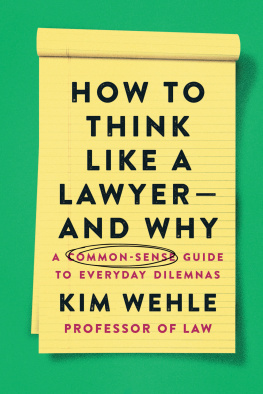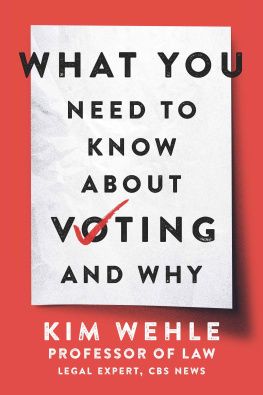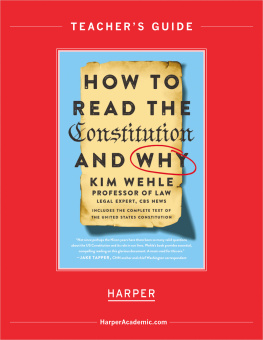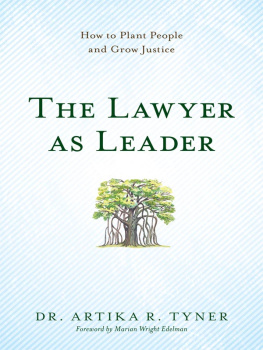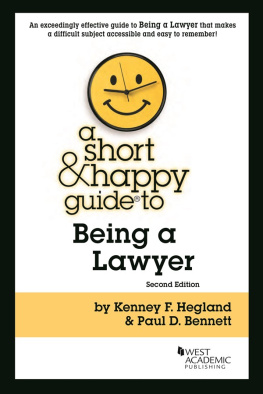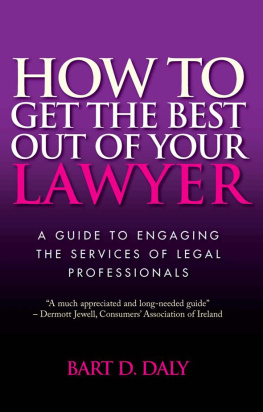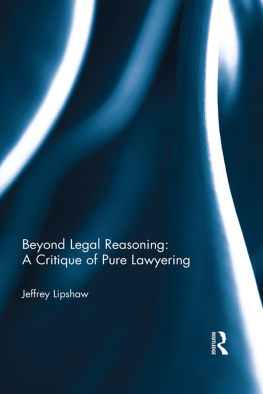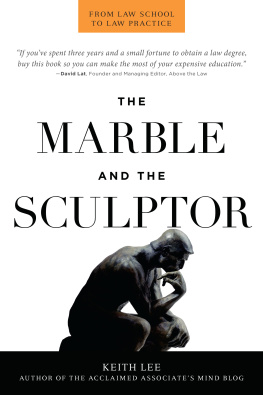Contents
Guide
I lovingly dedicate this book to my grandparents, Ann and Jack Nelson, who used common sense to live with integrity.
Contents
The straight line, a respectable optical illusion which ruins many a man.
V ICTOR H UGO , L ES M ISRABLES
W hile many of the people I come across in my life are either lawyers or are planning to become lawyers (blame Washington, D.C., and the local law school where I teach), even those with established careers not in law often tell me that they wish they had gone to law school. Still, a lot of people in the world dont love lawyers. Many believe that lawyers mostly add conflict to situations, rather than diffuse them, and that we do tend to do so aggressively, arrogantly, and without compassion. Lawyers are expensive, the legal system is painfully slow, and lawyers can make an astounding amount of moneylots more than most Americans. Drive down virtually any highway in America and youll see a billboard touting legal services for individuals who may have been in a car accident or experienced botched health care, possibly reinforcing the stereotype of lawyers as money-motivated predators willing to file bogus lawsuits that wind up burdening the rest of society in one way or another.
That said, its often those same people whowhen facing a decision about family or work or other responsibilitiesfind themselves suddenly considering hiring a lawyer or wishing they could somehow think like a lawyer to solve their problems. I hope this book will teach exactly that.
Do you need to make health care decisions for an aging parent but are unsure where to start? Are you at a crossroads in your career and dont really know how to move through it? Are you facing divorce and custody decisions and dont know how to even begin? Everyone needs to make big decisions in life, but not everyone can or will hire a lawyer. This is a book that will help you think for yourself, like a lawyer.
Anyone who is married to a lawyer or has a close friend who practices law knows that lawyers think a bit differentlywe often argue points that maybe should be left alone or find ourselves picking up typos on restaurant menus just because. This book wont turn you into a lawyer; there are probably enough of us already. Still, thinking like a lawyer is a valuable skill. This book will share some of those skills outside the law school classroom. While its true that law students, lawyers, and judges study lots of cases, the reason they do it in law school is that cases help people learn some basic legal skills, which I will begin to teach you here. They include:
- How to break complex issues into pieces
- How to gather pertinent facts, expertise, and competing points of view and then exhaust possible options
- How to anticipate what the other person is going to say
- How to consider the precedents that might be set by each choice and what each means for the future
- How to identify whose interests are at stake and whose interests should be served
- How to get buy-in from people affected by an outcome in squishy gray areas
- How to accept an outcome that you, personally, might not like but will tolerate as it may be the better path overall
It turns out that making decisions based on information that we already know and believeand aligning new experiences to our past experiences and beliefsis a very handy and productive means of making quick calls in a pinch. If we stand in line to buy a movie ticket and find out that the show we wanted to see is sold out, we might pick a runner-up based on existing biases: our lifelong affinity for thrillers or rom-coms, for example, or the belief that anything with Meryl Streep is probably good. By relying on our own biases and past experiences, chances are that we will choose a film that satisfies.
To some degree, that kind of practical, or heuristic, decision-making comes into play when we buy a car or even a house. We identify our likes and dislikes based on past experiences in order to sort through the options. Some people will always buy a Ford no matter what. Others might focus on gas mileage or emissions standards of various options. But because these purchases involve relatively high dollar amounts and even (at least for cars) personal safety, completely relying on our own, hard-wired notions of good and bad can be a bit risky. Unlike buying a movie ticket, the consequences of other decisions are lasting. So, in many situations were better off looking to more sophisticated methods of decision-making rather than simply falling back on what we already know. We might gather additional facts about car options, read opinions reviewing various cars, and maybe even speak to friends who recently purchased a car and piggyback on what they learned through the car-buying process.
Much of our decision-making methodology is automaticeven unconscious. But there exists a host of scholarly, scientific, and business-oriented resources about how to make good decisions more deliberately. Corporations will, and do, pay large amounts of dollars to consultants to better train their workforces around decision-making. And, of course, there are lawyers. Many people assume that lawyers become involved in decision-making only when there are laws involved, because lawyersunlike the rest of the populationknow something about the law. Like a doctor who has studied medicine and understands how the body works and its reaction to various interventions, lawyers know how to discern what the Constitution, statutes, regulations, and judicial decisions say. They are called upon to translate that language in ways that make sense to clients.
But describing the law is only a small part of how lawyers add value for their individual clients and society at large. Lawyers know how to think and make decisions in ways that non-lawyers generally dont. Law students learn how to think through thorny problemsnot what to think. I have seen it happen with hundreds of students during their first year of law school. And lawyering is a relatively unique skill. Gaming experts who have programmed computers to simulate medical exams have told me that simulating legal analysis is much more complex and nuanced, if doable at all. The value of a lawyerly mind is not something, at least for now, that artificial intelligence has successfully imitated.
Think about what happens when you visit a doctor. Medical professionals match symptoms against their vast knowledge base and make predictions and diagnoses based on how a patients symptoms and lab work match up with the characteristics of a particular medical condition. Good doctors and nurses are good communicators who know how to ask the right questions of a patientand how to listen to their patients experiences and needs. They are organized, compassionate, and conscientious. All of these skills can be brought to bear on good lawyering too.
Medical students are usually taught some form of diagnostic processassessment, testing, treatment, referral, and follow-up. Based on that information, they formulate a decision tree. The trunk of the tree might be a patients primary symptom, with arrows leading to other secondary symptoms and yes or no questions about whether, for example, the patient has a fever or not. Computer scientists have managed to develop algorithms that simulate the process of medical diagnosis.
Lawyers work from facts and precedents too, but legal decision-making especially benefits from independent and creative thinking. Law students may need to memorize information for certain exams, but lawyers cant just regurgitate Wikipedia entries to address their clients problems, nor do they just look up legal rules and tell clients what the rules say. Skilled lawyers crave ambiguity and nuance. They look for the nooks and crannies of a problem that has no clear answers and craft a series of possible responses or approaches. Its an entirely different way of thinking than jumping to a conclusion or a side and finding arguments to support a preconceived point of view. Even when lawyers are tasked with advocating a position vigorously for a client, part of their preparation is to exhaust all opposing arguments. Black-and-white thinking is very risky for lawyers because they can miss something importantand lose a case, a client, or even a bar license as a result.

